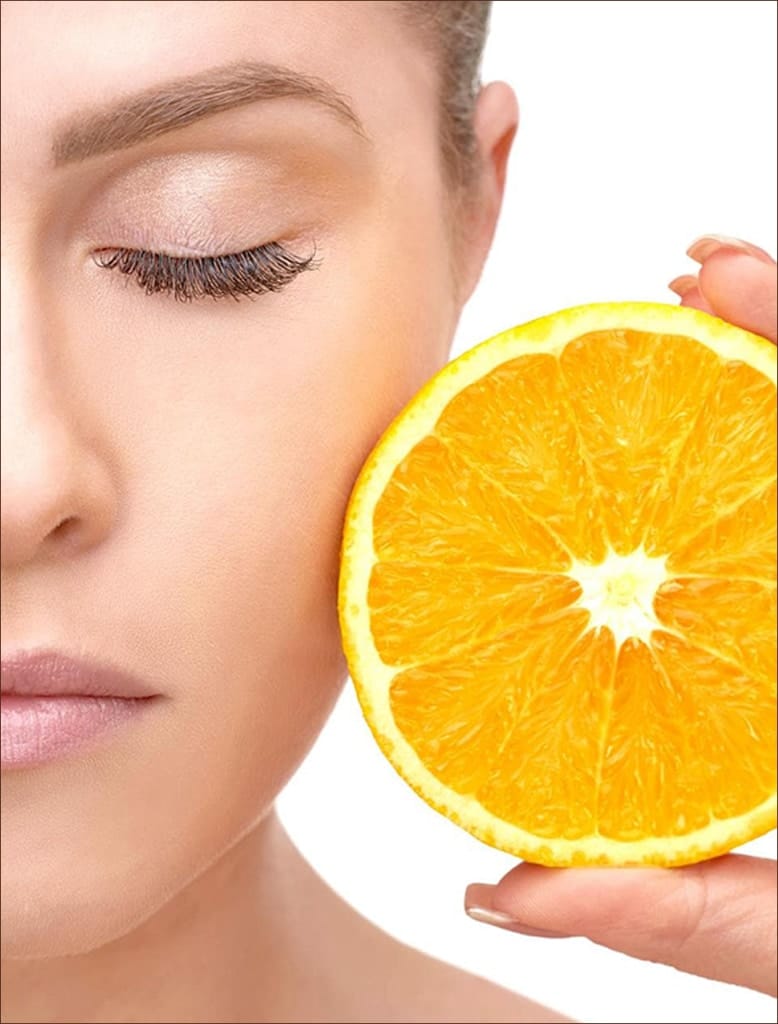Why is vitamin C so important in my skin care regime?

Vitamin C, or l-ascorbic acid as the chemically active form of vitamin C is known, is an antioxidant with a small molecular weight that can penetrate the skin.
This water-soluble antioxidant in concentrations of 5-15% has been proven to induce the production of collagen while helping inhibit the enzyme that breaks down collagen.
Vitamin C is also used to treat and prevent changes associated with photoaging as well as hyperpigmentation.
It functions to protect the skin from oxidative stress by neutralizing free radicals.
Does vitamin C reverse sun damage?
Vitamin C is effective in combatting the effects of UVA and UVB rays by neutralizing free radicals. UVA penetrates 30-40 times more deeply into the dermis than UVB and is responsible for destroying collagen, elastin and other dermal structures, causing premature ageing. Exposure of UV light also reduces the availability of Vitamin C in the skin and that is another reason it is so important to integrate into skincare routines.
Sunscreen is the obvious protective mechanism but does not block all the free radicals produced by UV exposure.
Generally, Vitamin C works synergistically in conjunction with Vitamin E, another powerful antioxidant.
Is it true that vitamin C can boost the skin’s radiance? If so, why is that?
Dr Zamani says “absolutely for the aforementioned reasons. Vitamin C is a potent antioxidant that helps reduce oxidative damage while stimulating collagen synthesis. It helps create clearer skin tone with its ability to help decrease pigmentation. And it has an anti-inflammatory effect which helps soothe and calm skin.”
Overall this is a well-researched and clinically proven powerhouse antioxidant with exceptional results in overall skin health.
There are conflicting opinions on whether vitamin C-infused skincare has a shelf life and its efficacy is compromised. What’s Dr Zamani’s take?
“The stability of Vitamin C is controlled by maintaining a pH of less than 3.5. In certain formulations, particularly clear serums, if it is exposed to light, it can become yellow, which means it has become oxidized and therefore less potent. Not all vitamin C’s are created equally, and the formulation is important in this regard.”
What is MZ Skin’s vitamin C serum?
MZ Skin’s Brighten & Perfect 10% Vitamin C Corrective Serum is formulated to activate collagen production, protect against premature ageing, and reduce the effects of UVA, and UVB rays. This peptide-rich formula helps control melanin production to guard against hyperpigmentation and age spots. Perfect too for a post summer fight against pigmentation. It is clinically proven to brighten skin by 29.4% in one month, and to reduce pigmentation and brown spots by 39.7%.
It was created because in order to enhance the skin, we need to nourish it with antioxidants, retinols and other key ingredients. Vitamin C should be in every skincare routine as it helps stop free radicals created by UV rays from damaging the skin while encouraging collagen synthesis.
Are there other antioxidants to consider?
Vitamin E is another antioxidant that fights inflammation while keeping the skin hydrated. It is a potent anti-inflammatory that soothes the skin and helps accelerate skin epithelization and contribute to photoprotection.
As mentioned before, Vitamin C works synergistically in conjunction with Vitamin E.
Hyaluronic Acid is another key ingredient in skincare and many products contain this hydrating component to help maintain and restore skin moisture and immediately plump skin.
What other ingredients can encourage new collagen production and how does this process work for each ingredient?
Vitamins C, B and E are important antioxidants for anti-ageing because of their ability to penetrate the skin. In concentrations of 5 – 15% vitamin C induces the production of collagen and helps inhibit the enzyme responsible for breaking down collagen.
Niacinamide (B3) helps regulate cell metabolism and regeneration and its use helps improve skin elasticity and pigmentation.
In brief, the key benefits of Vitamin C are:
- Essential for collagen synthesis
- Acts as a depigmenting agent that inhibits the action of the enzyme tyrosinase, decreasing melanin formation
- Anti-inflammatory effect. It can help promote wound healing and prevent PIH (post inflammatory hyperpigmentation)




